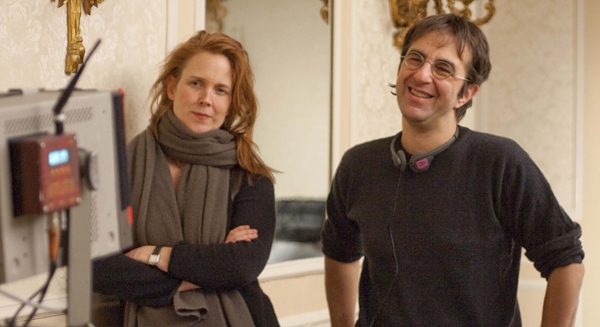The Independent Spirit Award-winning screenwriter talks exploring desire, sex as communication and that hot lesbian love scene in her new film “Chloe.”
Erin Cressida Wilson is an award-winning and internationally produced screenwriter, playwright and professor. She won the 2003 Independent Spirit Award for her critically-acclaimed screenplay, Secretary, starring James Spader and Maggie Gyllenhaal and directed by Steven Shainberg. She wrote the script to Fur: An Imaginary Portrait of Diane Arbus, starring Robert Downey Jr. and Nicole Kidman, which opened the Telluride and Rome Film Festivals in 2006, and went on to open internationally. One of her latest films Chloe opening this month, directed by Atom Egoyan and starring Julianne Moore, Liam Neeson and Amanda Seyfried. It is produced by Ivan Reitman. In, Chloe, Catherine, played by Moore hires high-end call girl Chloe, played by Seyfried to test her husband’s fidelity. The two women end up forming a complicated friendship, which leads to sex.
You write so much about desire. What intrigues you about it? 

Well, the glib answer is my mother, and her very evident desire that I watched as a child. She was a very sexual woman; she had a lot of longing in her and was very open open about it. Also, I grew up in the '60s and '70s so that charge really fueled me. 

Let’s go to the night where Catherine decides to sleep with Chloe. How did it happen?
I think there is anger when she decides to sleep with Chloe and there is curiosity and she is finally able to say: I want to know what you do to him and I want to know what he does to you. I need to know. 

You had said in an interview that sex is a revealing of our wounds and a very honest form of communication. Could you tell me what was revealed through the sex between Chloe and Catherine? 

Well I think that to some degree what is happening for Catherine are a lot of things. She is falling in love back with herself, finding her youth again and getting to know herself as a more mature woman sexually. I also think that there is a lot of jealousy going on. I think Catherine is jealous of Chloe and Catherine is jealous of her husband and Chloe is jealous of Catherine and her family. In some ways it explores the eroticism of jealousy and how jealousy can ignite sex.

Did you ever sleep with a woman?

I’m made out with them but never slept with one. The literal action of sex is not necessarily the whole spectrum of how to have sex with someone. Have I made love to a woman? I feel like it could be done through friendship, through talking, and through exchanging letters or presents. Have I gone down on a woman? No. 

Was there anything more you would have liked to explore between the relationship between Catherine and Chloe?

No. I’m glad they slept together. That was not always going to be the case.

In a previous interview, you have said that it’s easier for women to enter film than theater. Can you speak more about that? 

I think that theater is oddly conservative. I had a lot of moralistic reactions to my work in theater. The same kind of work could have been done by a man or a gay man and it would be OK, but female sexuality is just not a topic of the theater. I found that doors were more open [to women] in film and to portraying intimacy. The medium can hold it better.
